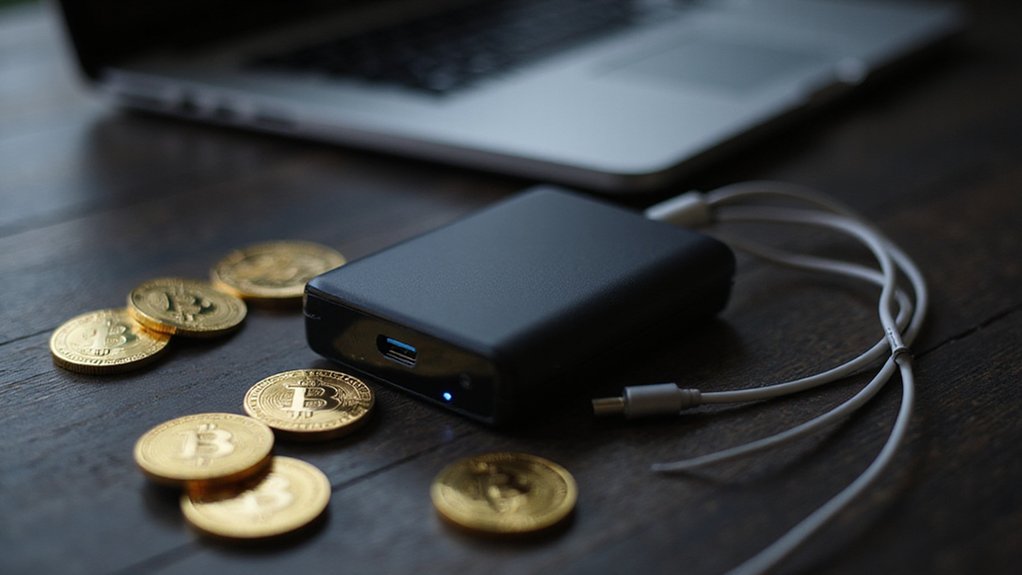Smart contracts are self-executing digital agreements that automatically enforce predetermined terms through code rather than traditional legal prose. These blockchain-based protocols operate on simple if/then logic, eliminating intermediaries while executing actions like payments or data transfers when specific conditions are met. The immutable code resides across decentralized networks, providing transparency and cost savings—though one might question whether removing human judgment entirely represents progress or merely efficient inflexibility that deeper exploration reveals.

Revolutionary though it may sound, a smart contract represents nothing more exotic than a self-executing digital agreement whose terms exist as code rather than the labyrinthine prose that typically characterizes legal documents.
These blockchain-based contracts operate on remarkably simple “if/when…then” logic, automatically executing predetermined actions when specific conditions materialize—no lawyers, no paperwork, no middlemen extracting their customary fees.
The mechanics prove remarkably straightforward.
Smart contracts reside across decentralized blockchain networks, with identical copies distributed among participating nodes to guarantee redundancy and eliminate single points of failure.
When transactions trigger contract conditions, the network validates these inputs before executing the embedded code, producing deterministic outcomes that remain consistent regardless of timing or location.
Every action gets recorded immutably on the blockchain, creating transparent audit trails that would make compliance officers weep with joy.
Their applications span from mundane automated payments (releasing funds when deliverables arrive) to sophisticated supply chain orchestration, insurance claim processing, and token issuance protocols.
The promise of trustless environments—where parties rely on mathematical certainty rather than human reliability—represents perhaps the most compelling aspect of this technology.
The advantages accumulate impressively: enhanced efficiency through paperwork elimination, improved accuracy via automated execution, substantial cost savings from intermediary removal, and complex workflow automation requiring minimal human intervention.
Smart contracts fundamentally transform traditional contract enforcement from an expensive, time-consuming ordeal into instantaneous digital execution.
Yet limitations persist with characteristic technological stubbornness.
Immutable code means buggy contracts cannot be easily corrected—a feature that becomes decidedly less attractive when millions hang in the balance.
Interpretation issues arise when elegant code fails to capture messy real-world intentions, while scalability concerns manifest during network congestion periods.
Legal ambiguity continues plaguing regulatory compliance across jurisdictions, and integration with physical assets remains frustratingly complex.
Given these inherent risks, comprehensive security reviews become essential for identifying vulnerabilities across multiple layers before contract deployment.
Despite these constraints, smart contracts represent a fundamental shift toward programmable agreements that execute automatically, transparently, and cost-effectively.
They eliminate traditional friction points while introducing entirely new categories of technical risk—a trade-off that increasingly defines modern financial innovation. These digital agreements enable the creation of decentralized applications and tokens that power everything from peer-to-peer lending platforms to automated insurance protocols. In supply chain management, smart contracts track temperature-controlled pharmaceuticals to ensure product quality and provide accurate shipping data throughout the distribution process.
Frequently Asked Questions
Can Smart Contracts Be Modified or Updated After Deployment?
Smart contracts are immutable by default once deployed—a feature that’s either reassuring or terrifying, depending on one’s perspective.
However, developers can implement upgradeable patterns using proxy contracts that delegate calls to modifiable implementation contracts. This preserves addresses and stored data while enabling logic updates.
The trade-off? Increased complexity and potential attack vectors, because apparently even blockchain’s vaunted immutability couldn’t resist the allure of “just one more feature.”
What Happens if There’s a Bug in a Smart Contract?
When bugs infiltrate smart contracts, the consequences prove rather unforgiving—immutability becomes a liability rather than an asset.
Financial losses can be irreversible, as demonstrated by notorious incidents like the DAO hack.
Reentrancy attacks, integer overflows, and access control failures represent common vulnerabilities that attackers exploit with predictable enthusiasm.
Since modification remains challenging (as previously discussed), thorough auditing and secure coding practices become essential preventive measures rather than luxuries.
Are Smart Contracts Legally Binding in Court?
Smart contracts exist in a fascinating legal limbo—they can be legally binding if they satisfy traditional contract elements (offer, acceptance, consideration), though courts are still wrestling with interpretation frameworks.
The enforceability hinges on whether parties intended legal obligations and can be identified.
Immutable contracts pose particular challenges, as recent rulings like *Van Loon v. Treasury* demonstrate courts’ struggle with autonomous code lacking human controllers.
How Much Does It Cost to Deploy a Smart Contract?
Smart contract deployment costs vary dramatically—from a modest $250 for basic contracts to $50,000 for complex implementations.
Gas fees (those delightfully volatile blockchain transaction costs) represent the primary expense, fluctuating with network congestion and Ethereum prices.
Factor in mandatory security audits ($5,000-$15,000) and the total investment becomes substantial.
Timing deployment during off-peak hours and optimizing code can reduce expenses, though cryptocurrency’s inherent volatility makes precise budgeting rather challenging.
Can Smart Contracts Work Without Internet Connectivity?
Smart contracts generally require internet connectivity to function, though some platforms enable offline transaction signing—essentially creating digital IOUs that execute once reconnected.
Developers can test contracts locally without internet, but actual blockchain execution demands network access for validation and consensus.
While offline wallets can prepare transactions (much like writing checks), the inherent distributed nature of blockchain technology means true smart contract functionality remains tethered to connectivity.









